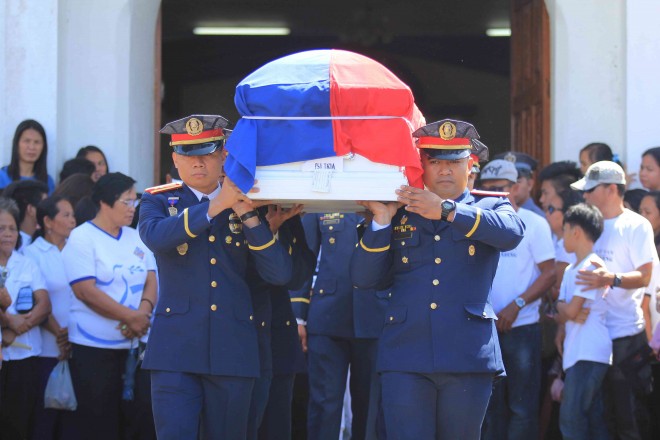
The coffin bearing “the last man standing” in Mamasapano, Senior Insp. Max Jim Tria, is carried by his batch mates at the PNP Academy to a nondescript burial site in Virac, Catanduanes. MARC ALVIC ESPLANA/INQUIRER SOUTHERN LUZON
VIRAC, Catanduanes—At the burial here of Senior Insp. Max Jim Ramirez Tria, no words could describe the grief but a gesture that the Tria family did not want to make a big deal of would betray how they felt about condolences from top government officials—where they placed wreaths from Interior Secretary Mar Roxas and President Benigno Aquino III.
A source in the family said when the wreath from President Aquino arrived, delivered by a member of the Presidential Management Staff (PMS), the father of the slain policeman, Senior Insp. Guillermo Tria Jr., refused to have it displayed at the Tria house’s entrance.
The elder Tria, however, relented after the PMS staffer explained that she was just doing her job and that it was protocol for the President’s wreath to be placed in the most prominent place of the house.
Another wreath was delivered on behalf of Interior Secretary Mar Roxas.
As the day wore on and the start of the burial drew near, how the family felt became more apparent in the way the wreaths were placed—Roxas’ was nearly hidden behind many other wreaths in front of it and Mr. Aquino’s was nowhere to be seen.
The younger Tria had been known to be so low profile that he would not even introduce himself as a policeman to people, according to his best friend, Paulo Sixto Landig.
And in true Tria fashion, the slain “last man standing” among 44 Special Action Force (SAF) men who were killed in a botched operation to get international terrorist Marwan, was buried at noon in an out-of-the way corner of the Palta Catholic Cemetery here that had to be cleared of vegetation.
At least 2,000 people mourned with the family for Tria, who was 27 years old.
Among them were members of media, who were asked by the family and Tria’s batch mates at the PNP Academy (PNPA) not to take photographs and videos of the last viewing of the casket at the small chapel at the cemetery.
The silence was broken by the loud sobs of the younger Tria’s mother.
A PNP band, sent from the regional headquarters of the Bicol police in Legazpi City, played taps after a 21-gun salute.
Among those at Mass, celebrated by Bishop Manolo de los Santos, were Rep. Cesar Sarmiento; Chief Supt. Victor Deona, Bicol police director; Chief Supt. Ignacio Panti, director of Bureau of Jail and Management Penology in Bicol; several mayors and provincial board members.
There was no high-ranking official from Malacañang or the Department of the Interior and Local Government.
The Tria family wanted the funeral to stay as private as possible. That same privacy was requested by the elder Tria, who heads the internal affairs service unit of the PNP in Catanduanes province.
The elder Tria refused to make public how he felt about his son’s, and 43 other SAF men’s, deaths. Among friends and relatives, however, he has been saying there should be no forgiveness for those responsible for the botched operation that authorities said succeeded in getting Marwan but failed miserably in protecting the 44 SAF members.
As common in burial rites, the younger Tria’s qualities were extolled in tributes and eulogies, the most extensive of which came from his best friend, Landig.
Landig, a friend of the younger Tria since elementary school, said the younger Tria is no longer low-profile in death, but a hero for an entire nation.
Landig recalled a moment with the younger Tria, back in May 2014, when the slain SAF member wondered aloud about being captured by an enemy and what he would do if that happened.
“They will not capture me alive,” Landig recalled his friend saying. “I will hold two grenades. Let me see if they (enemies) can come near,” the younger Tria had said, according to Landig.
Landig said it turned out that the younger Tria had not been joking. When his body was found, his hands held a grenade each. The younger Tria, said Landig, was “the last man gunned down” by Moro guerrillas in Mamasapano.
The younger Tria’s classmates at PNPA and comrades in SAF, who spoke of his courage and concern for fellow SAF members, demanded justice for the younger Tria and the other slain SAF men.
On behalf of the family, the younger Tria’s eldest brother, Ace William, said their parents should also be considered heroes for raising their sons to lead simple, quiet, happy lives.
“Mac-Mac’s (the younger Tria) death shows that one does not need to be a star or a rich man to make his life relevant,” said Ace William.